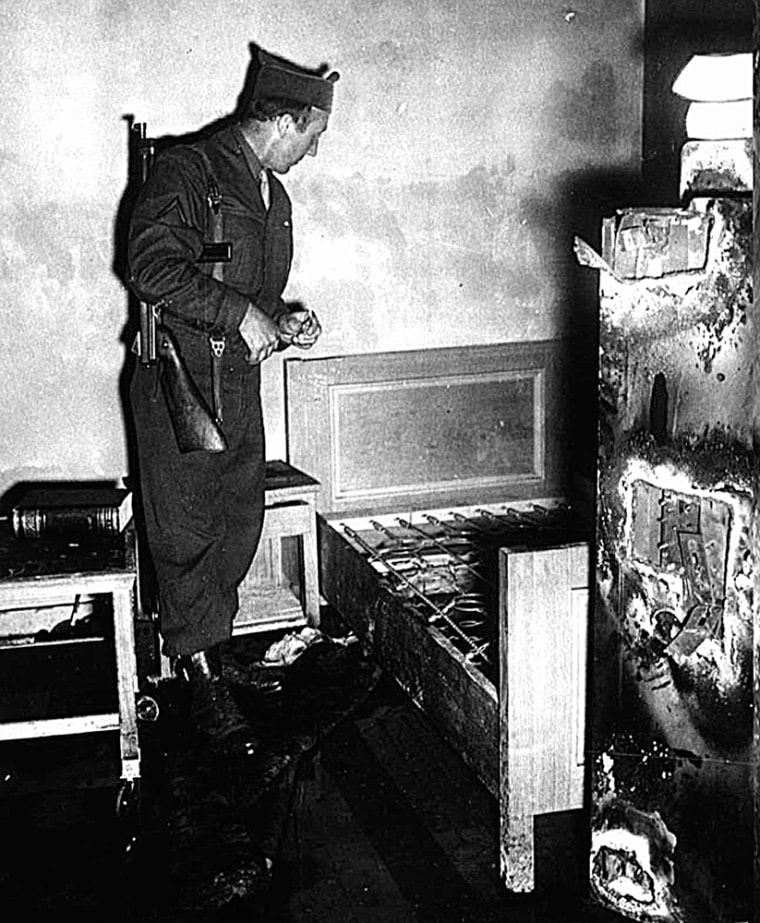Adolf Hitler was a shaking, graying, weakened man who “sank into himself” in the final days before his suicide on April 30, 1945, according to the first published account of his nurse, who worked in his bunker as Allied forces closed in on Berlin.
Erna Flegel, now 93 and living in a nursing home in northern Germany, told Britain’s Guardian newspaper in an interview published Monday that Hitler “had a lot of gray hair and gave the impression of a man at least 15 to 20 years older,” toward the end of his life.
“In the last few days, Hitler sank into himself,” Flegel said. “He shook a great deal, walking was difficult for him, his right side was still very much weakened as a result of the attempt on his life (in July 1944).”
With defeat imminent, Hitler, 56, killed himself and his mistress, Eva Braun, whom he married shortly before his death, in his underground bunker in Berlin.
Flegel dismissed Braun. “She didn’t have any importance. Nobody expected much of her,” she said. “She wasn’t really his wife.”
Praise for Goebbels' wife
By contrast, Flegel described Magda Goebbels, wife of Hitler’s propaganda chief Joseph Goebbels, as “a brilliant woman, on a far higher level than most people.”
The Goebbels also killed themselves and poisoned their six children in the bunker after Hitler’s death.
Flegel said she tried to persuade Mrs. Goebbels not to take the lives of her children as Russian troops got closer.
But Goebbels replied: “I belong to my husband. And the children belong to me,” Flegel recalled.
“You have to understand that we were living outside normal reality,” Flegel said.
The Guardian said Flegel had never given a public account before of her job as Hitler’s nurse and her time in the Berlin bunker. But as the 60th anniversary of end of World War II approached this weekend, she was speaking out for the first time.
Interview reveals her existence
Flegel’s existence became known after the transcript of an interview she gave to U.S. interrogators was declassified by the CIA four years ago, according to the Guardian.
In a separate interview with the German tabloid BZ, Flegel said she wanted her story to be known. “I don’t want to take my secret with me into death,” she was quoted as saying.
Asked by the Guardian what she thought of Joseph Goebbels, Flegel replied:
“I didn’t like him. Nobody liked him. There were always people who hung around him, of course, relatives and so on, but they were only there because they wanted to help their careers. There were also lots of women there who were young and pretty. They used to hang ’round his ministry. They had an easier time of it than the rest of us, for whom things were more difficult.”
She said Magda Goebbels did not say anything about her husband’s numerous affairs.
Hot chocolate with der Führer
The Goebbels’ children, Flegel said, were favorites with Hitler, who drank hot chocolate with them and allowed them to use his bathtub.
Flegel described how Hitler said goodbye to his medical staff on April 29, 1945, the evening before his suicide.
“He came out of the side room, shook everyone’s hand, and said a few friendly words. And that was it. There were a few people who then heard it (the shot, when Hitler killed himself the next afternoon) and there were others who didn’t. The Führer suddenly wasn’t there any more,” she recalled.
‘Suddenly ... doctors in the bunker’
“I knew that the Führer was dead. Suddenly there were more doctors in the bunker. ... I didn’t see Hitler’s body. It was taken up to the garden. The Führer had such an authority that when he was there you knew it. It felt so extraordinary,” she said.
Asked why she had remained silent for 60 years about her experiences, Flegel said they were simply too controversial.
“It was because after 1945 people started pointing fingers at each other and suggested that so and so was infected (a Nazi),” she said.
Flegel evaded the question of whether she regretted her role in the Third Reich. “Everyone has their own opinion,” she said.
